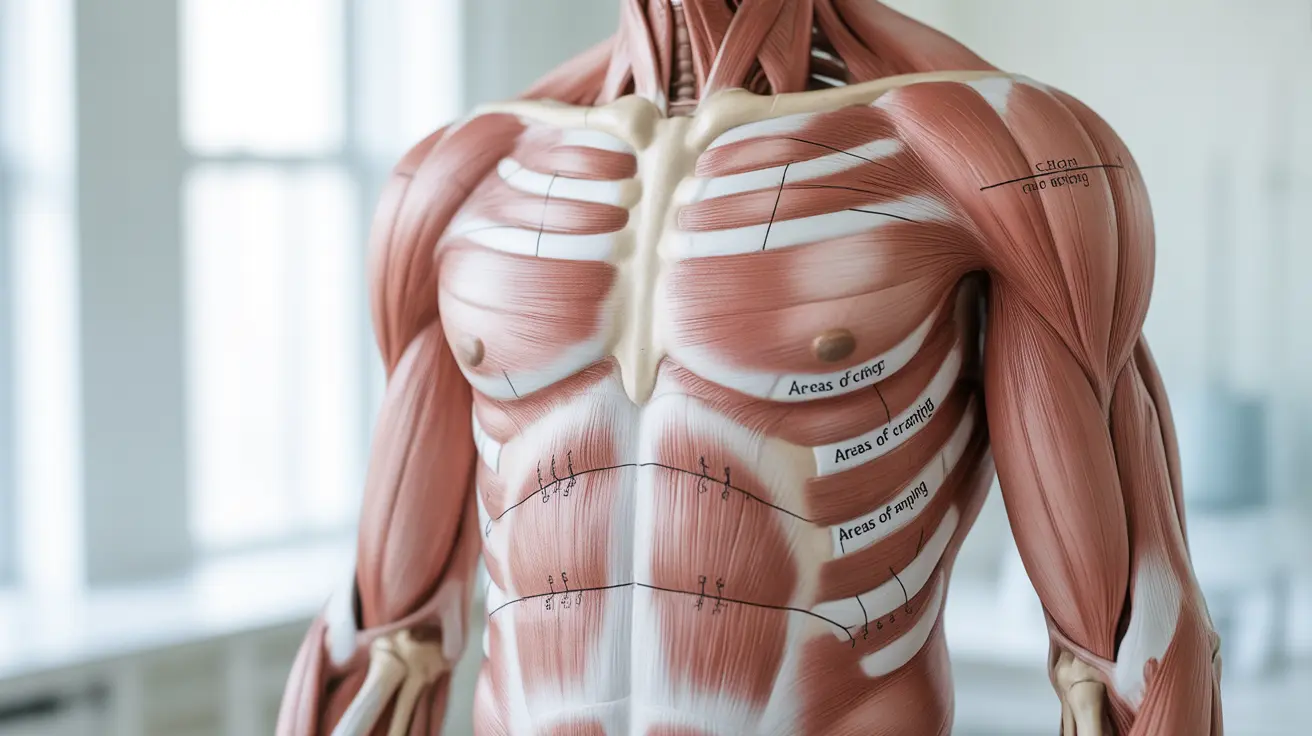Rib cage cramping can be an uncomfortable and sometimes alarming experience that affects many people. These muscle spasms in the intercostal muscles - the muscles between your ribs - can range from mild discomfort to severe pain. Understanding the causes, treatments, and warning signs can help you manage this condition effectively and know when to seek medical attention.
While rib cage cramping is often related to muscle strain or overexertion, it can sometimes indicate more serious underlying conditions. This comprehensive guide will help you identify the cause of your symptoms and determine the most appropriate course of action.
Common Causes of Rib Cage Cramping
Rib cage cramping can occur for various reasons, ranging from simple muscle strain to more complex medical conditions:
- Muscle strain from exercise or physical activity
- Poor posture or prolonged sitting
- Dehydration and electrolyte imbalances
- Costochondritis (inflammation of rib cartilage)
- Pleurisy (inflammation of the lung lining)
- Respiratory infections
- Anxiety and panic attacks
Identifying the Type of Pain
The nature of your rib cage cramping can provide important clues about its cause:
Muscle Spasms vs. Other Types of Pain
Muscle spasms typically feel like:
- Sharp, sudden tightening sensations
- Pain that worsens with movement or breathing
- Tenderness in the affected area
- Relief with rest or gentle stretching
Warning Signs of Serious Conditions
Seek immediate medical attention if you experience:
- Severe, persistent pain
- Difficulty breathing
- Pain accompanied by fever
- Chest pain radiating to arms or jaw
- Sudden onset of intense pain
Treatment Options and Home Remedies
Many cases of rib cage cramping can be effectively managed at home with conservative treatments:
Immediate Relief Measures
- Gentle stretching exercises
- Application of heat or cold therapy
- Deep breathing exercises
- Over-the-counter pain relievers
- Rest and activity modification
Prevention Strategies
To prevent future episodes of rib cage cramping:
- Stay well-hydrated
- Maintain good posture
- Warm up properly before exercise
- Ensure adequate electrolyte intake
- Practice stress management techniques
Frequently Asked Questions
What causes rib cage cramping and how can I tell if it is a muscle spasm or something more serious?
Rib cage cramping is often caused by muscle strain, overexertion, or poor posture. You can typically identify a muscle spasm by its sudden onset, localized pain that worsens with movement, and improvement with rest. More serious conditions usually present with additional symptoms like severe persistent pain, difficulty breathing, or fever.
How is rib cage cramping treated and what home remedies help relieve the pain?
Most rib cage cramping can be treated with a combination of rest, gentle stretching, heat or cold therapy, and over-the-counter pain relievers. Home remedies include staying hydrated, performing gentle exercises, and maintaining good posture. Massage and relaxation techniques may also provide relief.
When should I seek medical attention for rib cage cramping or pain?
Seek immediate medical attention if you experience severe persistent pain, difficulty breathing, chest pain radiating to your arms or jaw, pain accompanied by fever, or if your symptoms don't improve with home treatment after several days.
Can dehydration or electrolyte imbalances cause cramping in the muscles between the ribs?
Yes, dehydration and electrolyte imbalances can cause cramping in the intercostal muscles. Maintaining proper hydration and balanced electrolyte levels through adequate fluid intake and a balanced diet is essential for preventing these types of muscle cramps.
What are the common injuries or conditions that lead to rib cage pain and cramping?
Common conditions include muscle strain from exercise, costochondritis (inflammation of rib cartilage), pleurisy, respiratory infections, and anxiety-related tension. Sports injuries, poor posture, and repetitive motions can also lead to rib cage cramping.
Remember, while most cases of rib cage cramping are not serious and can be managed at home, it's always better to err on the side of caution and seek medical attention if you're uncertain about the cause or severity of your symptoms.




